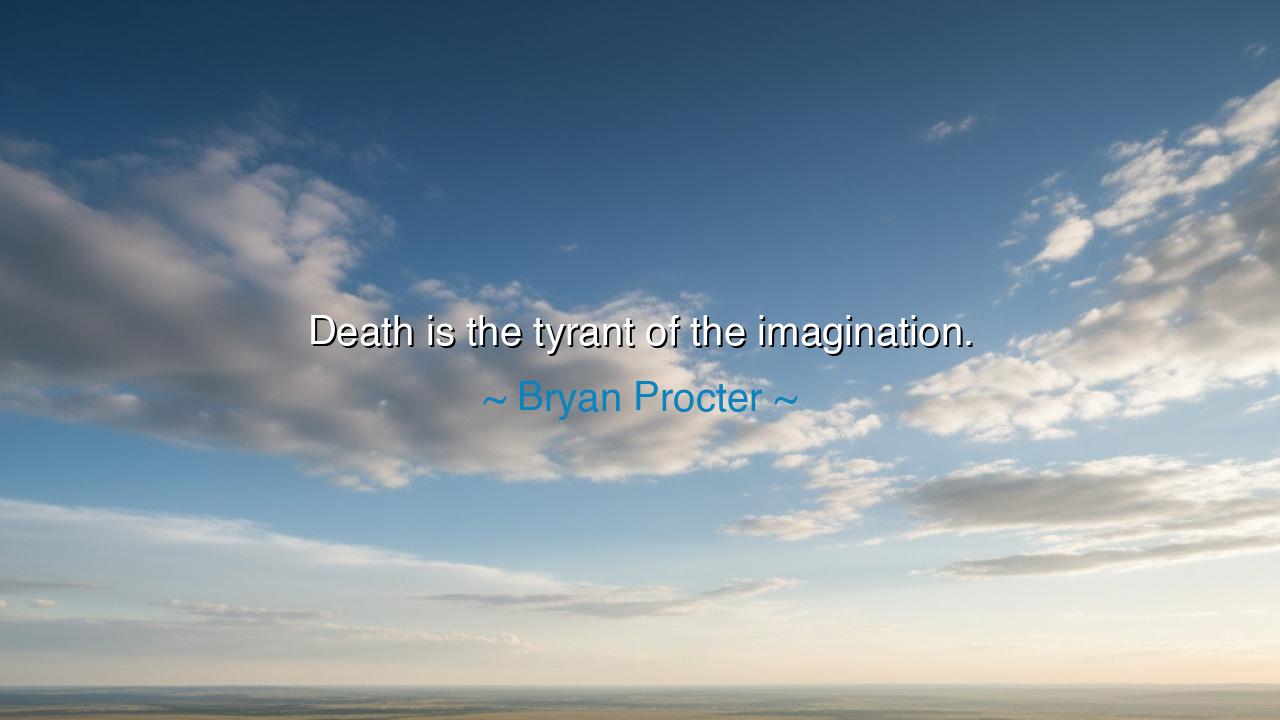
Death is the tyrant of the imagination.






The poet Bryan Procter, writing under the name Barry Cornwall, once declared: “Death is the tyrant of the imagination.” In these few words, he captured a truth that has haunted humanity since the dawn of thought: that while death may claim the body but once, it holds dominion over the mind throughout life. Procter understood that fear of death does not simply end lives — it governs them, shaping the way people dream, act, and love. It is not death itself that enslaves us, but our imagination of it — the shadows we conjure from the unknown. For death, silent and natural, comes to all. Yet imagination, that divine gift meant to create, becomes a prison when it bends before the specter of mortality.
To the ancients, this truth would have rung like a bell. The Stoics spoke endlessly of this tyranny, urging men to conquer it through wisdom. “It is not death that a man should fear,” wrote Marcus Aurelius, “but never beginning to live.” When Procter calls death the tyrant of the imagination, he is not speaking of death’s physical power — for that power is final and unchangeable — but of its psychological dominion, the way it binds the mind with invisible chains of dread. People do not fear death itself, but what they imagine it to be: darkness, separation, judgment, or oblivion. It is the imagination that crowns death king, giving it dominion even over the living.
And yet, Procter’s insight carries a deeper irony. The imagination, that which lifts humanity toward art, invention, and beauty, is also the very faculty that enslaves us with fear. It paints the unknown with terrible colors, and by doing so, paralyzes the spirit. Thus, men flee from risk, from love, from truth, lest they meet death sooner than expected. They wrap themselves in caution, not realizing that they have already surrendered their freedom to a tyrant who exists only in thought. The wise among the ancients knew this: that to fear death too deeply is to live half a life, and to imagine death constantly is to die a thousand times before the body perishes once.
Consider the example of Socrates, who faced death with serenity unmatched. When condemned to die by hemlock, he did not curse his fate or tremble before the void. Instead, he spoke calmly to his disciples of the immortality of the soul. “No evil can happen to a good man, either in life or after death,” he said. In that moment, Socrates shattered the tyranny of the imagination. He refused to let fear rule him, and by doing so, became freer in death than his accusers were in life. His courage was not born of ignorance, but of understanding — that death’s power exists only in the mind that fears it.
Bryan Procter, writing centuries later, spoke from the same well of understanding. He lived in a time when Romantic poets exalted emotion and imagination as divine forces. But even among dreamers, Procter saw the shadow — the way imagination, untamed, can devour peace. “Death is the tyrant of the imagination,” he wrote, as both warning and lament. It is not the grave that conquers us, but the terror we invent before we reach it. He teaches us that liberation comes not by denying death, but by reimagining it — as a passage, not an end; as transformation, not annihilation.
And what of the world we live in now? Still, men and women tremble at death’s name — not merely the end of breathing, but the end of identity, of legacy, of meaning. Yet the truth remains: death’s tyranny is an illusion of thought. To be freed from it, one must confront it directly, as the ancients did in meditation, or as artists do through creation. When one looks into the face of death without turning away, it ceases to be monstrous and becomes instead a teacher — reminding us that every heartbeat is precious because it will not last forever. The fear of death, when overcome, becomes gratitude for life.
So, my listener, take this lesson as your armor: do not let the imagination serve death, but life. Remember that your mind, if left unguarded, will make you a prisoner of phantoms. But if disciplined and awakened, it can turn fear into reverence, despair into wisdom, mortality into meaning. Death is not your tyrant unless you let it be. See it as the ancients saw it — as a boundary that gives shape to the infinite. Then live boldly, love deeply, and create as though every breath were eternal. For in the end, death rules only those who have never learned to truly live.






AAdministratorAdministrator
Welcome, honored guests. Please leave a comment, we will respond soon